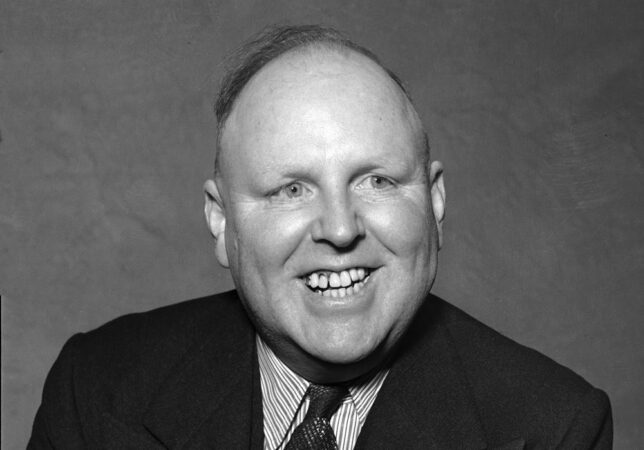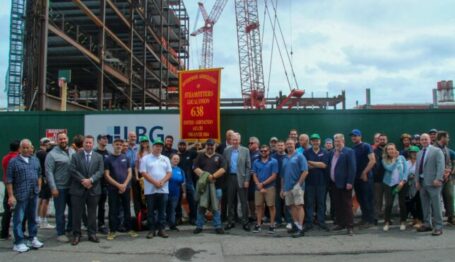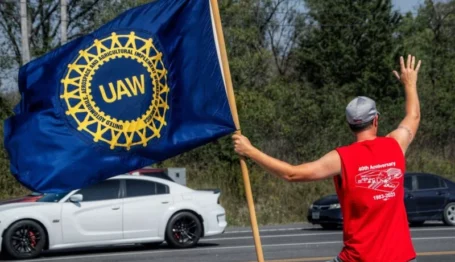Labor Watch
The Era of Labor Reform and Unionism’s Height: Labor’s Compromised Right
 Led by chief investigator Robert F. Kennedy, the Rackets Committee discovered that Dave Beck was running a personal-enrichment scheme at the expense of his members with the assistance of Nathan Shefferman, a Chicago-area labor relations consultant who passed kickbacks from businesses to Beck in exchange for weaker contracts. Credit: Los Angeles Daily News. License: https://shorturl.at/bcswG.
Led by chief investigator Robert F. Kennedy, the Rackets Committee discovered that Dave Beck was running a personal-enrichment scheme at the expense of his members with the assistance of Nathan Shefferman, a Chicago-area labor relations consultant who passed kickbacks from businesses to Beck in exchange for weaker contracts. Credit: Los Angeles Daily News. License: https://shorturl.at/bcswG.

The Era of Labor Reform and Unionism’s Height
The Conservative Response | The State of Big Labor, 1950
Labor’s Compromised Right | Responding to the Rackets
Labor’s Compromised Right: Dave Beck, Jimmy Hoffa, and the Teamsters
In his Freeman article warning about the early Eisenhower administration’s desire to weaken Taft-Hartley, Ball blamed the moderate “eastern Republican group” that had helped secure Eisenhower the GOP nomination in 1952 with advising the administration’s pro-union policy, writing:
Unfortunately, many leaders in that group, who now occupy influential positions in the Administration, are convinced that to survive politically the G.O.P. must “buy” the support of big union leaders by yielding to their demands. This despite the evidence of recent elections, which show that no leader can deliver the so-called “labor vote” and that Republicans have been supported by rank-and-file workers when they disregarded demands of union leaders and supported measures aimed at protecting and expanding individual worker rights.
Moderate Republicans seeking to appeal to organized labor despite the faction’s nearly nine-decade-long clear loyalty to the Democrats are as old as labor’s partisan divide. Depression-era liberal Republican New York Mayor Fiorello LaGuardia was a friend of unions both in Congress (in which he sponsored the Norris-LaGuardia Act that banned conditioning employment on not joining a union) and City Hall. It continues to this day, with the last two Republican federal administrations under George W. Bush and Donald Trump having vainly sought friendship with building trades unions.
Modern moderates have focused on the Teamsters specifically. In part, it is because in Eisenhower’s era, the Teamsters were the Republican union, and Teamsters leader Dave Beck was the “Republicans’ Labor Statesman.” But Beck had problems that the Senate Select Committee on Improper Activities in the Labor or Management Field (also known as the Rackets Committee or the McClellan Committee) was uncovering as President Eisenhower was feting him at the White House.
Led by chief investigator Robert F. Kennedy, the Rackets Committee discovered that Beck was running a personal-enrichment scheme at the expense of his members with the assistance of Nathan Shefferman, a Chicago-area labor relations consultant who passed kickbacks from businesses to Beck in exchange for weaker contracts. Beck eventually went to prison, though he was later pardoned by President Gerald Ford.
Beck’s successor was, if anything, worse. James Riddle “Jimmy” Hoffa was a Teamsters organizer and business agent from the Detroit area with eyes on Beck’s position and his own shot at national-level ill-gotten lucre. He also had extremely troubling allies from the Mafia. As Kennedy’s investigations began in 1956, Hoffa was already engaged in corrupt activities, with his involvement in the blinding of labor journalist Victor Reisel widely suspected. Reisel was attacked before he was to testify before a federal grand jury regarding the Teamsters Union’s chartering “paper locals”—ostensible local unions that existed for the principal purpose of manipulating internal union elections and conducting labor racketeering—under the control of associates of mobster John “Johnny Dio” Dioguardi.
Dioguardi was an ally of Hoffa, and in exchange for the power to conduct labor racketeering schemes using the “paper locals,” Dioguardi’s men would help Hoffa’s allies take control of New York–area councils of the Teamsters, helping Jimmy advance to the top of the Marble Palace’s greasy pole. While Hoffa was not charged for the attack on Reisel, it was widely suspected that he had foreknowledge of it or was involved in orchestrating it.
The Riesel attack would not be Hoffa’s only run-in with criminal behavior. With Kennedy’s committee sniffing around his finances, Hoffa tried to recruit private investigator Cye Cheasty to get a job on the committee to feed intelligence to Hoffa. But Cheasty turned double agent, alerting Kennedy to Hoffa’s scheme. The FBI and Kennedy directed Cheasty to arrange payment to him from Hoffa. Hoffa was arrested after the handoff but was acquitted by a jury thanks to prosecutorial bungling and the defense team presenting Hoffa as a friend of D.C.’s Black community.
But while he beat the rap for trying to corrupt Cheasty, the Rackets Committee exposed Hoffa as a profoundly corrupt figure, even as he ascended to the national Teamsters presidency. That set the Teamsters at odds with the still-new AFL-CIO, which demanded reforms. When they did not come, George Meany led an effort that expelled the Teamsters from the federation. They would not return for decades.
The legacy of the Teamsters’ expulsion from the AFL-CIO persists in American political muscle memory, especially among that moderate faction of Republicans. In the Hoffa and immediate post-Hoffa era, the Teamsters occasionally aligned with the GOP, but this alignment tended to accompany GOP favors to senior Teamster leadership. The union backed Richard Nixon over John F. Kennedy in 1960, a likely reprisal for the Kennedy clan’s involvement in the Rackets Committee investigations of Beck and Hoffa. Nixon would later commute Hoffa’s federal prison sentences.
The last Republican to receive the Teamsters’ backing was George H.W. Bush in 1988. Under his administration, the Department of Justice in a case led by then-U.S. Attorney Rudolph Giuliani conducted a civil Racketeer Influenced and Corrupt Organizations Act (RICO) case to remove the Mobbed-up Teamsters leadership. The case would ultimately be settled by a consent decree subjecting the union to strict government oversight that would not begin phasing out until the mid-2010s. Since the consent decree was issued, the national Teamsters Union has backed Democrats exclusively, despite repeated Republican attempts to court the union’s leadership.
In the next installment, union corruption led to a bipartisan consensus to limit the power of organized labor.



